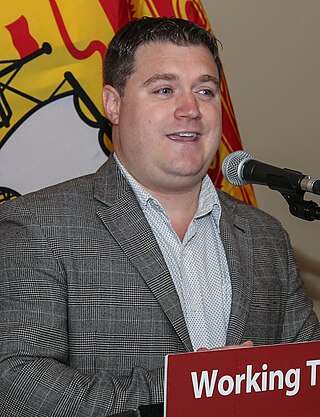
St. Thomas University is a Catholic, English-language liberal arts university located in Fredericton, New Brunswick, Canada. It is a primarily undergraduate university offering bachelor's degrees in the arts, education, and social work to approximately 1,900 students. The average class size is 30 and no class is larger than 60.

Sir Samuel Leonard Tilley was a Canadian politician and one of the Fathers of Confederation. Tilley was descended from United Empire Loyalists on both sides of his family. As a pharmacist, he went into business as a druggist.

The Progressive Conservative Party of New Brunswick is a centre-right conservative political party in the Canadian province of New Brunswick. The party has its origins in the pre-Canadian confederation Conservative Party that opposed the granting of responsible government to the colony. It has historically followed the Red Tory tradition. From the 2010s, the party underwent a shift to Blue Toryism after the election of Blaine Higgs as leader, who was premier from 2018 to 2024.

Walter Edward Foster was a Canadian politician and businessman in New Brunswick.
George Johnson Clarke was a New Brunswick lawyer, journalist and politician.

James Kidd Flemming was a businessman and politician in New Brunswick, Canada.

Sir John Douglas Hazen, was a politician in New Brunswick, Canada.

Saint Croix is a provincial electoral district for the Legislative Assembly of New Brunswick, Canada. The district includes the Town of St. Stephen and the Town of St. Andrews.

James Horace King, was a Canadian physician and parliamentarian.

Fundy-The Isles-Saint John Lorneville is a provincial electoral district for the Legislative Assembly of New Brunswick, Canada.
John Veriker Morrissy was a merchant and political figure in New Brunswick, Canada. He represented Northumberland County in the Legislative Assembly of New Brunswick from 1888 to 1890 and from 1903 to 1916 and Northumberland in the House of Commons of Canada from 1921 to 1924 as a Liberal member.
James Murchie was a farmer, businessman and political figure in New Brunswick. He represented Charlotte County in the Legislative Assembly of New Brunswick from 1875 to 1878 as a Liberal member.
George Skeffington Grimmer, was a lawyer and political figure in New Brunswick. He represented Charlotte County in the Legislative Assembly of New Brunswick from 1862 to 1864 as a Liberal member.
Thomas Aaron Hartt was a farmer, merchant and political figure in New Brunswick, Canada. He represented Charlotte County in the Legislative Assembly of New Brunswick from 1903 to 1911 and Charlotte in the House of Commons of Canada from 1911 to 1921 as a Conservative and then Unionist member.
Robert Watson Grimmer was a merchant and politician from New Brunswick, Canada. He represented Charlotte County in the Legislative Assembly of New Brunswick from 1915 to 1920 and Charlotte in the House of Commons of Canada from 1921 to 1930 as a Conservative member.

William Frederick Todd was a businessman and political figure in New Brunswick. He represented Charlotte County in the Legislative Assembly of New Brunswick from 1899 to 1903 and Charlotte in the House of Commons of Canada from 1908 to 1911 as a Liberal member. Todd served as the 16th Lieutenant Governor of New Brunswick from February 28, 1923, to December 27, 1928.
Major-General Hardy Nelson Ganong CBE, VD, ED was a Canadian sportsman and a military commander who served in both World War I and II.

Grimmer is a geographic parish in Restigouche County, New Brunswick, Canada.

Saint-Quentin is a geographic parish in Restigouche County, New Brunswick, Canada.

John B. Ames is a Canadian politician, who was elected to the Legislative Assembly of New Brunswick in the 2014 provincial election. He represented Saint Croix as a member of the Liberal Party, but was voted out by the people of Charlotte-Campobello / Saint Croix in the September 24, 2018, election, being replaced by Greg Thompson.













